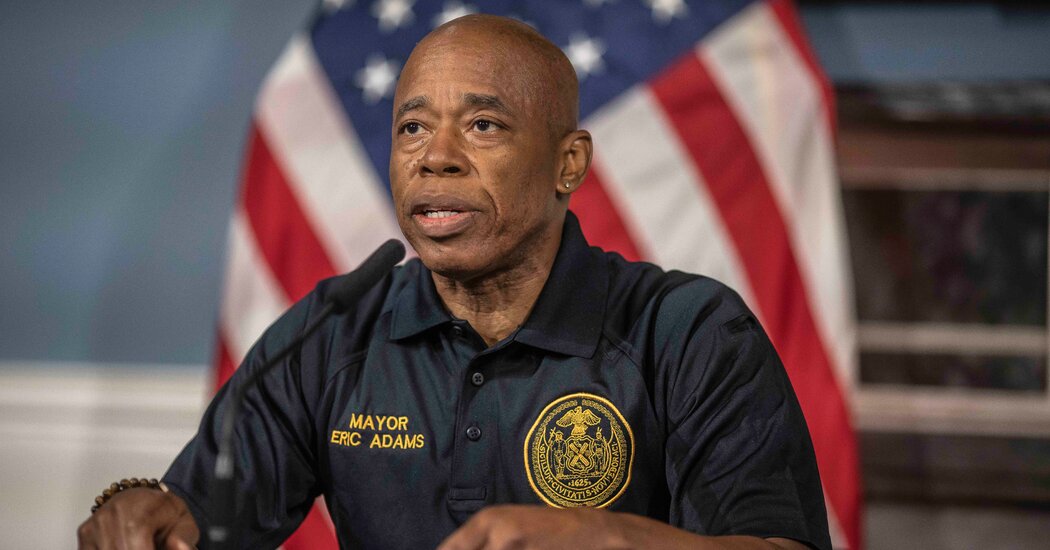
New York City is embracing artificial intelligence and using it to send robocalls featuring the mayor’s voice in many languages.
The calls to New Yorkers have a familiar ring to them. They all sound like Mayor Eric Adams — only in Spanish. Or Yiddish. Or Mandarin.
Has the mayor been taking language lessons?
The answer is no, and the truth is slightly more expensive and, in the eyes of privacy experts, far more worrisome.
The mayor is using artificial intelligence to reach New Yorkers through robocalls in a number of languages. The calls encourage people to apply for jobs in city government or to attend community events like concerts.
“I walk around sometimes and people turn around and say, ‘I just know that voice. That voice is so comforting. I enjoy hearing your voice,’” the mayor said at a recent news conference. “Now they’re able to hear my voice in their language.”
New York City’s embrace of the technology came this week as Mr. Adams announced a 50-page “action plan” for artificial intelligence — an effort to “strike a critical balance in the global A.I. conversation,” he said, by embracing its benefits while protecting New Yorkers from its pitfalls.
Mr. Adams also introduced a new chat bot that he said could eventually be used to field basic questions received on the city’s 311 help line.
Mr. Adams said that 70 percent of 311 calls were simple questions about things like alternate side parking and that those could be handled by a chat bot, allowing city workers to focus on more complex questions and reducing wait times for callers.
“We know the term A.I. can cause anxiety,” Mr. Adams said. “People think all of a sudden you’re going to have a Terminator-type figure come in and take over government and displace human beings. That’s just not the reality. Take a deep breath; get a grip.”
Privacy advocates still criticized the robocalls, arguing that it was “deeply Orwellian” to try to trick New Yorkers into thinking that Mr. Adams speaks languages that he does not. The group has previously criticized the mayor’s embrace of facial recognition technology and his dispatch of a police robot to patrol the Times Square subway station.
“Yes, we need announcements in all of New Yorkers’ native languages, but the deep fakes are just a creepy vanity project,” said Albert Fox Cahn, executive director of the Surveillance Technology Oversight Project.
Mr. Cahn said the project was reminiscent of when Mayor Edward I. Koch’s voice was used on sanitation trucks in the 1980s to order cars to move so that the trash could be picked up. The focus should be on high quality translations of the message, Mr. Cahn said, and not on the person delivering them.
The robocall effort has cost about $32,000, city officials said, and the chat bot cost about $600,000 to develop. The city used the Voice Lab program by a company called Eleven Labs to generate the phone messages.
Privacy advocates warned that the mayor’s voice could be used to promote disinformation. One such example, which Mr. Cahn’s group created as a parody message, offered up Mr. Adams greeting New Yorkers in an Elvish language and Klingon.
Mr. Cahn said it took approximately 10 minutes and cost $50 to create the fake message by taking audio from the mayor’s podcast and processing it through an online text-to-speech tool. “A good chunk of that time was trying to figure out how to write the words in Klingon and Elvish,” Mr. Cahn said.
For Mr. Adams, appearing to speak Spanish in a city where more than 1.5 million New Yorkers speak the language at home may have its advantages. His predecessor, Bill de Blasio, often spoke Spanish as mayor, which he said he studied during graduate school at Columbia University in the 1980s. (In an uncharitable assessment, Mr. Adams said Mr. de Blasio “butchers” the language.)
Michael R. Bloomberg took Spanish lessons at City Hall, but his skills were gleefully skewered by a popular Twitter account known as “El Bloombito.”
And connecting with Spanish-speaking residents in their language may also help Mr. Adams’s re-election bid in 2025, given that many of the voters in his base are people of color outside Manhattan, including Latino and Asian voters who speak other languages.
“This feels like a re-election tactic, not a way of actually serving the public,” Mr. Cahn said.
A test of the small business chat bot demonstrated how it offers basic information in a conversational tone. How do I get a liquor permit? A roughly 320-word response offered guidance for caterers and microbreweries.
Mr. Adams suggested asking who was the best mayor. The city chat bot did not venture a guess, but Chat GPT listed four contenders: Mr. Bloomberg, Mr. Koch, Fiorello La Guardia and Rudolph Giuliani.
